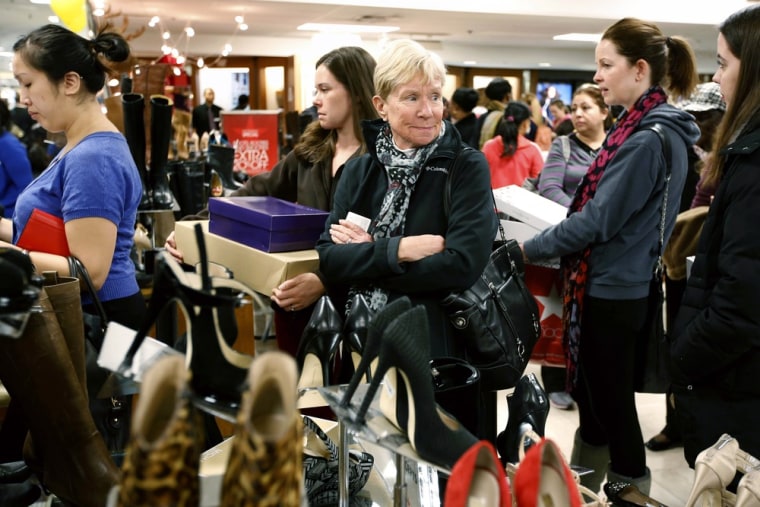Whether or not lawmakers agree on a deal to reopen the government and avoid default, the Washington battle over the debt ceiling may already be the Grinch who stole Christmas.
Two new surveys show that many consumers are scaling back spending due to the shutdown—a worrying trend for retailers as the crucial holiday spending season quickly approaches. What's more, retail executives are saying they are already feeling the pinch.
About 40 percent of consumers have curbed spending as a result of the partial U.S. government shutdown, according to a survey commissioned by Goldman Sachs and the International Council of Shopping Centers that interviewed 1,025 adults between Oct. 10 and Oct. 13.
"As congressional leaders optimistically predict a budget deal may soon be reached, it is clear that the fallout of the past two-week impasse in Congress has affected consumers' willingness and maybe their ability to spend," said Michael Niemira, ICSC's vice president of research.
The fallout's been especially sharp among lower-income consumers. Nearly half of those earning $35,000 or less said they've scaled back their spending versus about a third of respondents making $100,000 or more.
While most of those scaling back said they were cutting spending a little, about 13 percent of survey respondents said their reductions were "considerable."
As early as last week, Family Dollar Stores Executive Chairman and CEO Howard Levine said the situation was not helping consumer confidence.
More than half of Family Dollar customers collect some sort of government assistance so when they read about the current uncertainty, "it impacts their confidence regarding their outlook," Levine told analysts on Oct. 9.
"The threat of the shutdown, the uncertainty regarding some of the government assistance … (and) the uncertainty around job growth are very real to our customer every day," he said.
Ripple effects for holiday spending
The shutdown also could have a lingering impact. A separate National Retail Federation survey of 6,415 respondents shows the prolonged Washington gridlock is affecting consumers' plans to spend during the holidays. The average holiday shopper is expected to spend about $738 on gifts, decor, greeting cards and more, down from about $752 last year.
About 29 percent of respondents said the situation would somewhat or very likely affect their holiday spending. Nearly a third of those ages 55 to 64 said it would impact their plans, the highest of any age group.
"Though the foundation for solid holiday season growth exists, Americans are questioning the stability of our economy, our government and their own finances," said NRF President and CEO Matthew Shay. "We expect consumers to set a modest budget for gifts and other holiday-related purchases as they wait and see what will become of the U.S. economy in the coming months."
Before the shutdown, the consensus projections for holiday sales called for around 3 percent to 4 percent growth, said Christine Barton, a partner at The Boston Consulting Group.
"The longer the shutdown goes on, I think the more likely holiday is to be flat to down," Barton said, adding that sales could decrease anywhere from 3 percent to 6 percent from 2012.
Before the shutdown, consumers had shown signs of increased optimism along with lower intentions to trade down and more ambitions of trading up, Barton said.
"It was a relatively good news story for the U.S.," she said. "The longer the shutdown goes on, the more destabilizing news that accompanies it, the more likelihood the response to the shutdown changes the trends rather than just a dip in consumer sentiment."
Retailers on shutdown impacts
Uncertainty tends to hurt consumer confidence. On Tuesday, Wal-Mart CEO Mike Duke described the global economy as "tough and unpredictable" in prepared remarks at its annual meeting for the investment community. He also noted that the shutdown remains on its shoppers' minds.
"As you would expect, we're following the situation very closely," Duke said. "The competition is also tough. I see it when I am out visiting their stores. And of course, the holidays are right around the corner—raising the stakes even further on serving customers and delivering on performance."
Ruby Tuesday CEO and President James Buettgen told analysts on an Oct. 9 earnings call that the shutdown "obviously doesn't do much to build confidence."
"It's a little hard to tell where things are going to go until some of that clears up, and we see where consumers really are," Buettgen added.
—By CNBC's Katie Little. Follow her on Twitter@KatieLittle.
Related stories:
Shutdown is having 'notable impact' on mortgages
The best time to buy hot toys this holiday season
